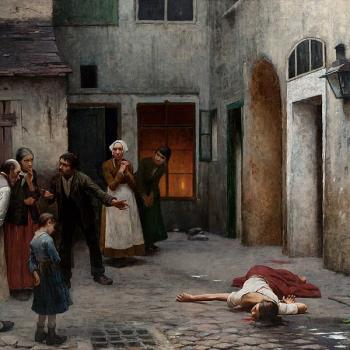 Pope Francis preached an extraordinary extemporaneous sermon in answer to a question in Cuba. It was on the consecrated life and holy orders and how these people are called by God to make a gift of themselves to others, to be the mercy of God to the least of these.
Pope Francis preached an extraordinary extemporaneous sermon in answer to a question in Cuba. It was on the consecrated life and holy orders and how these people are called by God to make a gift of themselves to others, to be the mercy of God to the least of these.
I think that what the Holy Father said speaks also of those whom God has given the gift of caregiving and child-rearing. Both of these are thankless and disrespected work in our society. And yet, they are the very essence of the Beatitudes.
No one can be closer to God than a young mother, sitting up all night next to the shower holding a croupy baby. There is no work more Godly than changing the diapers of an elderly parent. The opportunity to care for others is God’s personal invitation to do His work in this life.
Pope Francis really hits the ball out of the park with this sermon. Fortunately, Aleteia has provided us with a copy.
Here’s is a brief sample:
How many women and men religious consume — and I repeat the verb, consume — their lives caressing ‘rubbish,’ caressing those that the world throws away, that the world despises, that the world wishes didn’t exist, those who the world today — with methods and new analyses that we have, when it’s foreseen that one can come with a degenerative illness, it’s proposed to “send them back” before they’re born. The smallest.
And a young woman full of dreams begins her consecrated life giving life to the tenderness of God, to his mercy. Sometimes they don’t understand, they don’t realize, but, how wonderful it is for God, and how much good it does to a person, for example the smile of someone with muscle spasms who doesn’t know how to do it. Or when they want to kiss you and they slobber on your face. This is the tenderness of God. This is the mercy of God. Or when they are mad and they strike you. Consume my life like this? With this “rubbish” in the eyes of the world. This speaks to us only of one person. It speaks to us of Jesus, who because of the pure mercy of the Father made himself nothing. He emptied himself, says Philippians, chapter 2. He made himself nothing. And these people to whom you dedicate your life imitate Jesus, not because they wanted to, but because the world brought them here like this. They are nothing. And they hide them and they don’t show them or they don’t visit them. And if they can and there’s still time, they “send them back.”
Thank you for what you do and in you, thank you to all the women and all the women consecrated to the service of the useless, because with them you can’t start a business, you can’t make money, absolutely nothing constructive is brought forward, so to speak, with these brothers and sisters of ours, with these least ones, with the smallest. There Jesus shines forth and there my decision for Jesus shines forth. Thank you and thank you to all men and women consecrated who do this.
Father, I’m not a nun. I don’t take care of sick people. I’m a priest. And I have a parish, or I help the pastor of a parish. Which one is my Jesus of predilection? Which one is the least one? Which one most shows me the mercy of the Father? Where do I have to find him?
Obviously I continue following the protocol of Matthew 25, there you have all of them: the hungry, the imprisoned, the sick, there you will find them. But there is a privileged place for the priest where this last one, this least one, this smallest one is found — and it is the confessional. And there, when this man or this woman shows you his misery — careful because it’s the same misery that you have and from which God saved you, eh? from getting to that point. When he or she shows you his misery, please, don’t scold him. Don’t scold him, don’t punish him. If you don’t have sin, throw the first stone. But only under that condition. If not, think of your sins and think that you could be that person and think that you could potentially fall even lower, and think that you in this moment have in your hands a treasure, which is the mercy of the Father. Please, priests, don’t get tired of forgiving. Be forgivers. Don’t get tired of forgiving, like Jesus did. Don’t hide in fears or in rigidities. Just like this nun and all of those who are in the same ministry as she is, they don’t get furious when they find a sick person who is dirty, but instead serve him, clean him, take care of him. Just like this, you, when a penitent comes, don’t react badly, don’t get neurotic, don’t cast him out of the confessional, don’t scold him. Jesus embraced them. Jesus loved them.
Read the rest here.













